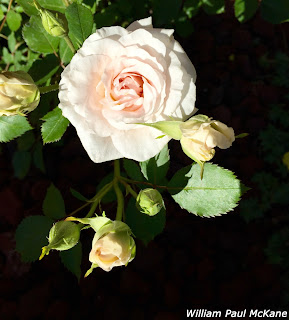After
telling several parables to his disciples, Jesus asks, “Do you understand all
these things?” “Yes,” they replied, in
their all-too-quick fashion. In truth,
has anyone really understood well and completely the meaning of Christ’s parables
of the kingdom? One understands by
living them well. Whom do we know who
has lived the gospel well, but Christ Jesus, and his blessed Mother—and various
saints, all to some imperfect yet beautiful degree. As Origen wrote (184-253 AD): “Jesus is himself the Kingdom.” Do you know of a better Kingdom of God than
the fullness of God’s presence in Jesus Christ, and hence to a degree, in us,
the body of Christ?
“The
Kingdom of heaven is like a merchant searching for fine pearls. When he finds a pearl of great price, he goes
and sells all that he has and buys it.”
Jesus shows us what is of ultimate value or worth in human life: discovering God in Him, loving Him, following
Him, obeying Him, rejoicing in Him. “My
happiness lies in God alone,” sings the Psalmist, who has found in God alone
his pearl of infinite value. Whoever
finds God, finds the Pearl of great price. Whoever does not find God, however rich or powerful, comes up empty.
But
here is the uniqueness of finding God:
the One who is found is found to be ever with, in, and beyond the one
finding. The God who is found is utterly
inexhaustible, a spring of pure water ever flowing up out of the depths of the
unseen earth. “The one who seeks,
finds.” And the person who truly finds
finds that he must keep seeking, as St. Anselm teaches. And he must keep loving, following, obeying, or
what he has found will be lost again. It
is not that this Pearl of great price is slippery, like an eel; rather, we are
inconstant, unsteady in our love affair with the all-loving One. And so we must seek to fall in love again and
again—just as two married folks must keep striving to love each other ever
afresh, here and now, and not say with Pushkin:
“I loved you once, I love you still—perhaps.” That is not love, nor is it the way of life
for one who keeps falling in love with the God who “loved His own in the world,
and loved them to the End” (John 13).
“Late
have I loved you, O Beauty ever ancient, ever new; late have I loved You. Behold you were with me, but I was not with
you. You were within, but I was without,
spending myself on these things that ultimately do not satisfy, and would not
be at all if You did not will them to be.”
The true lover of God, like St. Augustine in his Confessions
paraphrased here, knows that he has “only just begun,” and in truth does not
love as he knows and wants to love. And
yet, even to taste, even to begin to live God in Christ, the Pearl of infinite
value, one begins to leave the world of passing things and enter into communion
with that which simply is.
“He
who begins to love begins to leave. Many
there are who are leaving Babylon, and yet they do not know it. And yet they are leaving by the affections of
their heart” (Augustine on the Psalms). “Ubi caritas et amor, Dei ibi
est.” “Where charity and love are, there
is God.” One who loves has indeed found
the Pearl of great price, “the many-splendored thing.”


